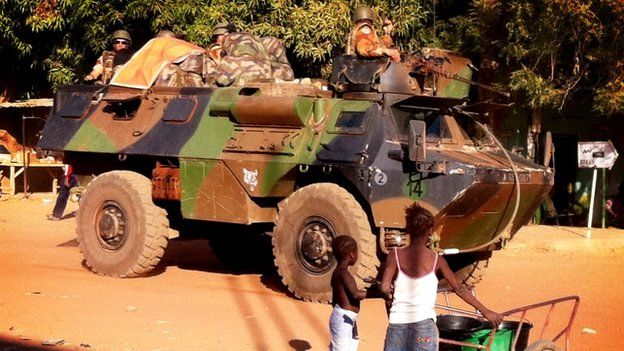Mali crisis: Civilians flee Islamist takeover and French bombs
- Published
- comments

At the checkpoint on the northern edge of Niono, a group of Malian soldiers sat in the shade, watching the news - about their country, about Oprah interviewing Lance Armstrong, or whatever - on a battered television.
Some of the soldiers had been part of the force routed several days earlier, when Islamist rebels attacked the garrison town of Diabaly, an hour's drive on a dirt road to the north.
For a frontline defensive position, the scene - a few listless soldiers and a couple of armoured vehicles parked beside a small bridge nearby - did not inspire confidence in the fighting abilities of the Malian army.
This, we were told, was as close to Diabaly as journalists were allowed to venture.
So we sat in the shade with the troops, watching the road north, until - abruptly - a small, convoy of motorbikes arrived, followed quickly by several battered minibuses packed with women and children.
'Light-skinned Arabs'
Since Monday, few civilians had managed to escape from Diabaly.
The Islamists had cut off the road south and the population - in effect held hostage inside the town - was preoccupied with staying out of trouble and hunkering down in their homes to avoid the daily air strikes from the French military against the Islamists positions.
But the convoy told a different story. No-one was sure if all the Islamists had left town. But it seemed that way.
Most of them had just fled a few hours earlier, heading north - perhaps towards Mauritania - leaving vehicles and equipment behind.
"Maybe there are 30 of them left," said Mamadou Coulibaliy, who was bringing his cousin and her baby daughter - fast asleep and covered in dust - out on his motorbike.
"They were a mixture - some light-skinned Arabs. Foreigners. And some black men," he said.
We spoke to half a dozen people. All told a similar story.
The Islamists, or jihadists as most people called them, had not hurt anyone in town after the initial attack. In fact they'd offered sweets and biscuits to the children on the streets.
"But we were still scared of them," said a woman named Ramatou Diarra, 29. "We hid in our homes for days."
'Exodus'
Another man said that the Islamists had torn down the cross on top of the town's Catholic church.
A few minutes later, the prefect of Niono, an urbane, gregarious man in flowing white robes named Sedou Traore, confirmed with a quick telephone call that the rebels had indeed abandoned Diabaly.
"There has been an exodus," he announced rather grandly.
"Like ghosts, the population is on the move - terrified, traumatised. They have been trapped there. Now we are becoming more reassured but the fear remains - panic even. Even the smallest thing can spark it. It's a mania.
"The jihadists have planned a huge operation in order to seize our country. What matters now is the speed of the military operation. There can be no more hesitations. Let us track them down and make sure they cannot return.
"Mali is a religious country - but not Islamist. The jihadists have benefited from passive, innocent complicity from inside (towns like Diabaly). They've used religion, because someone will welcome a stranger to his home in the name of Islam, while this person is really trying to invade his country!"
Some hours later, in the market town of Segou further south across the Niger river, we visited the hospital where the wounded from Diabaly had been brought.
There were 15 Malian government soldiers who'd been injured during the initial attack on Monday and subsequent retreat.
Only two civilians had been brought in. One was a 13 year old by called Mohazou Cisse. His leg had been broken, almost certainly by shrapnel from one of the French airstrikes.
The ankle and knee were now swaddled in plaster, with 3 rather rough-looking wooden branches acting as a splint to hold the leg straight.
Blood was seeping onto the mattress beneath, but Mohazou said he was in no pain.
Like the others he said the Jihadists were "light-skinned. They tried to talk to us." He'd heard the French airstrike - several big explosions, then he'd fallen over.
Beside the bed, his father quickly intervened, anxious to reassure the foreign journalist that no blame was being directed at the French.
"They have saved us. They have saved Mali," he said earnestly.